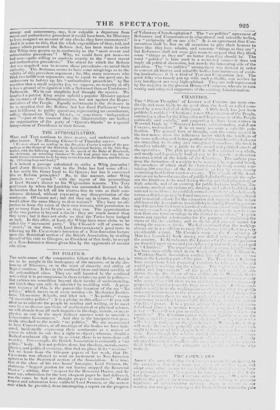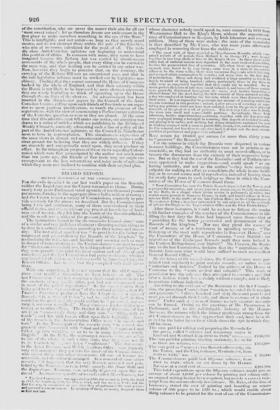Tilr CORN-1. ‘ws.
Autuav t"o! the
Atm:
■ 1,111,-.., Corn-inv. H.••
• ■.•
111.0:03: \ r, NV;I.Stitlg OM* ClICI:41t's 111,, the pal*
s : ••• in our
of the constitution, who are never the nearer their aim for all our 'most sweet voices': let us therefore devote our endeavours in the first place to make ourselves something in the eye of the State." This is intelligible, and not unfair—so long as they merely stand neuter, and do not obstruct those within the pale of the franchise, who aim at measures calculated for the good of all. The mid- dle class Anti-Corn-law agitators are beginning to understand this position of affhirs. In common with many, they seem to have imagined because the Reform Act was carried by simultaneous movements of the whole people, that every thing can be carried in the saute way, and that nothing can be carried in any other way. Now, however, they begin to perceive that, on the conn•ary, the carrying of the Reform Bill was an exceptional ease, and that in the rule legislative reforms must be worked out by legislative ma- chinery. Finding that they cannot surround the House of Commons backed by the whole of England, and that their minority within the House is not likely to be increased by mere abstract argument, they are wisely beginning to think of operating upon the House through Oh.; intlitun of the electors. An advertisement has been inserted in the alauchester papers by the Council of the Anti- Corn-law Lesette. ceiling upon such friends of free trade as are supe- rior to mere partisan predilections, to watch the progress of the registrations, with the view of commencing a Parliamentary agitation of the Corn-law question as soon as they are closed. At the same time that this advertisement fell under our notice, our attention was drawn to a series of articles which are publishing in the Eilininteesh 'Weekly Chruntek, earnestly advocating such a line of policy on the part of the Anti-Corn-law asaitators, as the Council in Manchester seem to have in contemplation. This simultaneous expression of the same views in distant and unconnected quarters, seems a suffi- cient ground for believing that they are widely diffiessa. It' they are sincerely and energetically acted upon, they must produce an effect. In the triumphant progress of those views regarding Coloni- sation which were first promulgated by the author not much more than ten years ago, the friends of free trade may. see ample en- couragement to the less ostentatious and noisy mode of agitation which they seem now inclined to combine with their original plan.



























 Previous page
Previous page